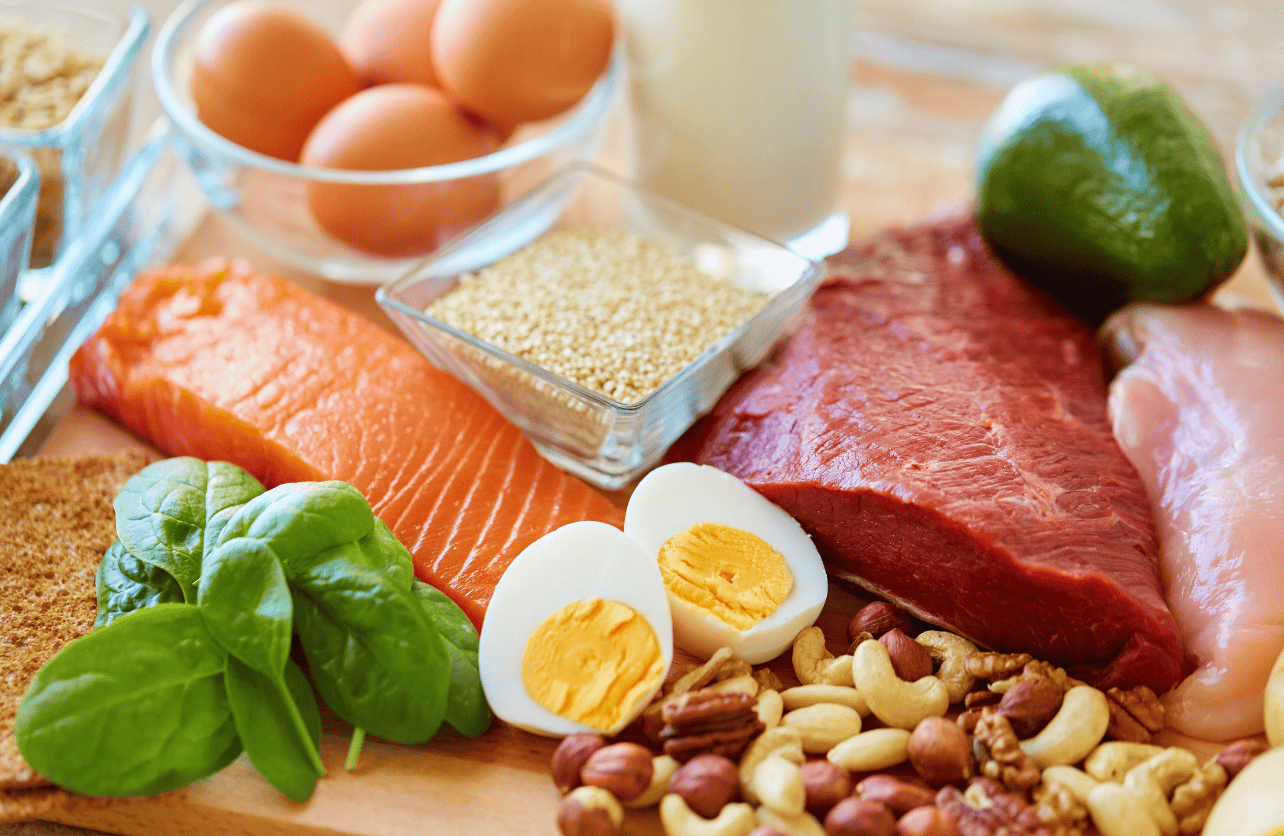Does Protein Give You Energy?

While carbohydrates and fats are often highlighted as primary energy sources, protein also plays a crucial role in maintaining energy levels. But does protein actually provide you with energy? Let’s get into the science behind protein and its relationship with energy to understand how it fits into your overall nutrition plan.
What Is Protein?
Protein is one of the three essential macronutrients, alongside carbohydrates and fats, necessary for the body’s growth, repair, and maintenance. Composed of amino acids, proteins serve as the building blocks for muscles, skin, enzymes, and hormones. Unlike carbohydrates and fats, which are primarily used for energy, protein’s main functions revolve around structural and regulatory roles within the body.
How Does the Body Use Protein?
Structural Functions
Proteins are integral to building and repairing tissues. For instance, muscle proteins help repair muscle fibers after exercise, while collagen provides strength and elasticity to the skin and connective tissues.
Enzymatic and Hormonal Roles
Enzymes, which are proteins, catalyze biochemical reactions essential for digestion, metabolism, and cellular function. Hormones like insulin and growth hormone, also proteins, regulate various physiological processes.
Transport and Storage
Certain proteins transport molecules throughout the body. Hemoglobin, a protein in red blood cells, carries oxygen from the lungs to tissues, while ferritin stores iron in the liver.
Protein vs. Carbohydrates vs. Fats for Energy

Carbohydrates
Carbohydrates are the body’s preferred energy source. They are broken down into glucose, which is readily used by cells for immediate energy. Excess glucose is stored as glycogen in the liver and muscles for later use.
Fats
Fats are a concentrated energy source, providing more than twice the energy per gram compared to carbohydrates and proteins. They are stored in adipose tissues and can be mobilized during prolonged, low-intensity activities.
Proteins
While not the primary energy source, proteins can be used for energy when carbohydrates and fats are insufficient. This process is known as gluconeogenesis, where the body converts amino acids from proteins into glucose.
Does Protein Provide Energy?
Indirect Energy Source
Protein itself is not a direct energy source like carbohydrates and fats. However, it can contribute to energy production through gluconeogenesis, especially during periods of fasting, intense exercise, or carbohydrate-restricted diets.
Energy Yield
Each gram of protein provides approximately 4 calories of energy, similar to carbohydrates. While this is a modest amount compared to fats, the body typically relies on proteins for energy only when necessary.
When Can Protein Be Used for Energy?
Starvation or Fasting
During extended periods without food, the body begins to break down muscle tissue to obtain amino acids for gluconeogenesis, ensuring a continuous supply of glucose for vital functions.
Intense Exercise
Prolonged or intense physical activity can deplete glycogen stores, prompting the body to utilize protein for energy to sustain performance.
Low-Carbohydrate Diets
In diets low in carbohydrates, such as ketogenic diets, the body adapts by increasing gluconeogenesis, using more protein to maintain adequate glucose levels.
Benefits of Protein Beyond Energy

Muscle Maintenance and Growth
Adequate protein intake is essential for preserving muscle mass, especially during weight loss or aging. It supports muscle repair and growth, contributing to overall strength and metabolism.
Satiety and Weight Management
Protein is highly satiating, helping to reduce appetite and prevent overeating. This can aid in weight management by promoting a feeling of fullness and reducing calorie intake.
Metabolic Health
Protein plays a role in maintaining metabolic health by supporting hormone production, enzyme function, and immune system performance.
Recommended Protein Intake for Energy Levels
General Guidelines
The Recommended Dietary Allowance (RDA) for protein is 0.8 grams per kilogram of body weight for the average adult. However, individual needs may vary based on factors like age, activity level, and health status.
Athletes and Active Individuals
For those engaged in regular intense exercise, protein needs can range from 1.2 to 2.2 grams per kilogram (~o.6-1g per lb) of body weight to support muscle repair and energy demands.
Weight Management
Higher protein diets, ranging from 1.2 to 1.6 grams per kilogram (~0.6-0.8g per lb), can enhance satiety and support lean muscle mass during weight loss.
Protein Sources for Sustained Energy

Lean Meats
Chicken, turkey, and lean cuts of beef provide high-quality protein with minimal fat, supporting muscle maintenance and energy levels.
Fish and Seafood
Fish like salmon, tuna, and cod are excellent protein sources rich in omega-3 fatty acids, which promote heart health and reduce inflammation.
Plant-Based Proteins
Beans, lentils, tofu, tempeh, and quinoa offer protein for vegetarians and vegans, along with fiber and essential nutrients that contribute to sustained energy.
Dairy Products
Milk, yogurt, and cheese provide protein along with calcium and other vital nutrients, supporting bone health and energy balance.
Eggs
Eggs are a versatile protein source, containing all nine essential amino acids necessary for optimal body function and energy production.
Final Thoughts
While protein is not the body’s primary energy source, it plays a vital role in energy production under specific circumstances. Ensuring adequate protein intake supports not only energy levels but also muscle maintenance, satiety, and overall metabolic health. For teenagers, athletes, and those following specialized diets, understanding the multifaceted role of protein can help optimize nutrition and performance. As with any dietary component, balance and moderation are key to harnessing the benefits of protein without over-reliance for energy needs.
Building a Stronger You
Supplement Institute is the fruit of extensive online publishing experience, spanning the breadth of SEO strategies to the nuances of paid advertisements. Our journey, marked by significant achievements and learning moments, inspires our core mission: to empower our readers with an abundance of information. By sharing insights and key learnings, we aim to provide you with the knowledge needed to navigate the complex world of supplements, helping you make well-informed decisions for your health and well-being. Welcome to Supplement Institute, where information is your greatest supplement.